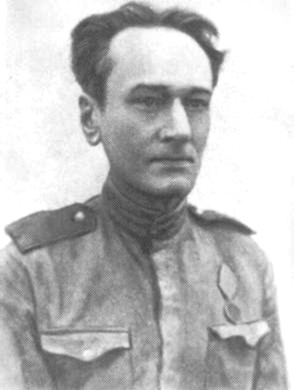Daniil Andreyev facts for kids
Quick facts for kids
Daniil Andreyev
Дании́л Андре́ев |
|
|---|---|

Daniil Andreyev (1943)
|
|
| Born |
Daniil Leonidovich Andreyev
November 2, 1906 |
| Died | May 30, 1959 (aged 52) Moscow, Russian SFSR, USSR
|
| Nationality | Russian |
| Occupation | Writer, poet, mystic |
| Parent(s) | Leonid Andreyev Alexandra Andreeva |
Daniil Leonidovich Andreyev (born November 2, 1906, in Berlin – died March 30, 1959, in Moscow) was a Russian writer, poet, and a Christian mystic. He was known for his unique spiritual ideas and his main book, Roza Mira.
Contents
Daniil Andreyev's Life Story
Daniil Andreyev was the son of Leonid Andreyev, a famous Russian writer from the early 1900s. Even Maxim Gorky, another well-known writer, was his godfather! Sadly, Daniil's mother, Aleksandra Mikhailovna, passed away shortly after he was born. Because of this, his father gave baby Daniil to his mother's sister, Elizabeth Mikhailovna Dobrova, to raise him.
This decision had two big effects on Daniil's life. First, when his father, Leonid Andreyev, left Russia in 1917 after the Bolshevik Revolution, young Daniil stayed behind. Second, Daniil grew up in a home that was very religious.
Early Life and Writing
Like many young people of his time, Daniil loved to write. He started creating poetry and stories when he was very young. He finished high school, but he couldn't go to university. This was because his family background was not considered "working class" by the government at the time. To support himself, he worked as a graphic artist and wrote in his free time.
War and Imprisonment
In 1942, Daniil Andreyev joined the Red Army during World War II. He served in a non-fighting role. During the difficult Siege of Leningrad (1941-1944), he helped move important supplies across Lake Ladoga.
After the war, Andreyev returned to his normal life. However, in April 1947, the Soviet authorities arrested him. They accused him of writing things that were against the government. He was sentenced to 25 years in prison. While in prison, he had a heart attack in 1954. This was the start of the heart problems that would later cause his death. In the same year, his sentence was made shorter, to 10 years. He was released on April 22, 1957, but he was already very ill. The government officially cleared his name on July 11, 1957.
Roza Mira and Other Works
While Daniil Andreyev was held in Vladimir Central Prison from 1947 to 1957, he had many spiritual experiences. During this time, he began writing his most important book, Roza Mira. He finished the book after he was released from prison.
This book became known in the Soviet Union through a secret system called samizdat. This meant people would secretly copy and share books that the government didn't allow. Roza Mira was first officially published in Russia in 1991. Later, in 1997, an English version of the book was published in the United States.
Daniil Andreyev's Writings
Most of the works Daniil Andreyev wrote before 1947 were destroyed by government officials. They were considered "anti-Soviet literature." This included his novel Wanderers of Night (Russian: Странники ночи). This book was about people who quietly opposed the Soviet government and its ideas.
Even though he was in prison, Andreyev managed to rewrite some of his poems from memory. He also tried to rewrite Wanderers of Night, but he could only restore a few pages. Luckily, some of his childhood writings, including his very first poems from when he was 8 years old, were saved by a friend.
Roza Mira
His main book, Roza Mira (Russian: Роза Мира, which means "The Rose of the World"), describes many layers of spiritual reality that surround Earth. It talks about a future religion called Roza Mira that will bring all people and countries together. It also discusses future events.
Other Works
Besides Roza Mira, Daniil Andreyev also wrote a long poem called The Iron Mystery (Russian: Железная мистерия), which was published in 1990. He also created a "poetic ensemble" (which is what he called it) titled Russian gods (Russian: Русские боги). The full text of this work was published in 1995, along with other writings.

